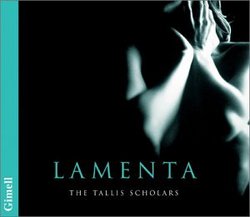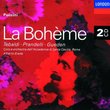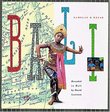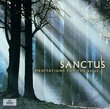| All Artists: Alfonso [1] Ferrabosco, Thomas [Composer] Tallis, Antoine Brumel, Robert White, Giovanni Pierluigi da Palestrina, Sally Dunkley, Deborah Roberts, Tessa Bonner, Rachel Platt, Janet Coxwell, Philip Cave, James Gilchrist, Steven Harrold, Toby Watkin, Charles Daniels, Richard Edgar-Wilson, Simon Davies, Rufus Müller, Mark Padmore Title: Lamenta Members Wishing: 0 Total Copies: 1 Label: Gimell UK Release Date: 9/11/2001 Album Type: Import, Original recording reissued Genres: Special Interest, Pop, Classical Styles: Vocal Pop, Opera & Classical Vocal, Historical Periods, Early Music Number of Discs: 1 SwapaCD Credits: 1 UPCs: 755138199620, 028945499628 |
Search - Alfonso [1] Ferrabosco, Thomas [Composer] Tallis, Antoine Brumel :: Lamenta
 | Alfonso [1] Ferrabosco, Thomas [Composer] Tallis, Antoine Brumel Lamenta Genres: Special Interest, Pop, Classical
![header=[] body=[This CD is available to be requested as disc only.]](/images/attributes/disc.png?v=430e6b0a) ![header=[] body=[This CD is available to be requested with the disc and back insert.]](/images/attributes/disc_back.png?v=430e6b0a) ![header=[] body=[This CD is unavailable to be requested with the disc and front insert at this time.]](/images/attributes/greyed_disc_front.png?v=430e6b0a) ![header=[] body=[This CD is unavailable to be requested with the disc, front and back inserts at this time.]](/images/attributes/greyed_disc_front_back.png?v=430e6b0a) |
Larger Image |
CD DetailsSimilar CDs
Similarly Requested CDs |
CD ReviewsOne of my favorite Tallis Scholars recordings Sator | Sydney, Australia | 08/06/2005 (5 out of 5 stars) "Although this CD is partly a compilation that collects onto one CD a number of previously recorded Lamentations of the Prophet Jeremiah by Tallis, White, and Brumel, the Tallis Scholars have also added two further Lamentations by Ferrobosco the Elder and Palestrina. The idea was a brilliant one - the ultimate flattery being several similar compilations of Lamentae by other groups that came out afterwards. Ferrobosco the Elder was a favorite in the court of Queen Elizabeth I - a fact all the more remarkable given the presence of superlative English Catholic composers such as Byrd and Tallis at the time. That a foreign composer - a Catholic at that - should have been imported into England may seem strange. It can all seem a case of the grass being greener on the other side of the fence - that is until you hear some of his finest compositions. Then you can see why Alfonso Ferrobosco "Il Padre" was such a favorite of Elizabeth - not only as a composer who helped to introduce the English to the Italian madrigal, but as a composer of equally remarkable sacred music. Ferrobosco lived at a time of heightened religious tensions so that in England he was suspected of being a Catholic spy, whereas on the Continent he risked being seen as a traitor serving a Protestant queen and having his family punished. His impact on the English music scene was enormous and his music is as good as anything being written in the British Isles at the time. The Tallis Lamentations needs fewer words of introduction. I will only say they are astonishingly beautiful works - profoundly moving and deeply affecting, they have an emotional impact of a kind equalled by few works of Renaissance polyphony. They are easily the highlights of this recording. Antoine Brumel is mentioned by Monteverdi as being one of the composers of the Prima Prattica - the older school of the First Practice that brought polyphony to the peak of perfection and complexity in the 1500s to the earlier decades of the 1600's - in other words before the Counter Reformation effected enormous changes in musical practice. Interestingly, Peter Phillips himself included the Brumel Lamentations in his list of 10 desert island recordings for Goldberg early music magazine. White is probably the least internationally accepted composer here. Even then his Lamentations are certainly worth hearing for the drama he brings to them. Lastly, Palestrina is the composer, who over the centuries has had the most consistently high reputation on account of his role in perfecting a Counter Reformation style that emphasises clarity of the word in the text over displays of great contrapuntal complexity. However, in our age we increasingly tend to see this as a compromised dilution of the polyphonic achievements of the Prima Prattica composers before him. Still, despite these caveats, his compositions show such a sense of refined sense of taste his music seems to defy such criticism. All in all, this is a wonderfully successful recording that deserves to be widely recommended. Even continental reviewers - usually more critical of the Tallis Scholar's occasional tendency towards superficial polish - such as Maricarmen Gomez writing in Goldberg early music magazine described this recording as "originality combined with perfection" and awarded the prestigious Goldberg five star rating." Darkness and light FrKurt Messick | Bloomington, IN USA | 05/18/2005 (5 out of 5 stars) "--Compositions--
This collection of pieces consists of six settings of the Lamentations of Jeremiah, a book of the Bible that is used in the Christian liturgy most heavily during Holy Week, during the service that has come to be known as Tenebrae. As Peter Phillips states in his notes, 'the darkness, the emotive events of Holy Week itself, the sombre texts and intense music, combined to make Tenebrae one of the most powerful experiences in the Church's year.' Most of the composers followed the sequence of verses in the Hebrew text, denoted by letters from the Hebrew alphabet. There are distinctions between these, separated like verses; each of the pieces ends with the call 'Ierusalem, Ierusalem, convertere ad Dominum Deum tuum' - Jerusalem, Jerusalem, return to the Lord thy God. Phillips likens the effect of these compositions to illuminated manuscripts, where the stark content of the words often contrasts with the beauty and colour of the artwork surrounding them. --Composers-- There are five composers featured here: Alfonso Ferrabosco (the elder), Thomas Tallis, Antoine Brumel, Robert White, and Giovanni Pierluigi da Palestrina. Only Palestrina differs from the others in the textual construction of these lamentations. These composers were contemporaries, roughly speaking - Brumel was the first, composing in the late 1400s to early 1500s; Tallis was born in 1505, and he with Ferrabosco, White and Palestrina were composing through much of the 1500s. Each of the composers is considered a master of liturgical compositions, and the trained ear will hear much similarity as well as much individuality in the pieces contained here. Palestrina is probably the most accomplished of the lot, being, according to one commentary, 'the summation of Renaissance polyphony.' Polyphony is distinct from Gregorian and other sorts of chant (which is monophonic) or much of choral/vocal music today, which is homophonic (a major melody line with harmony). Ferrabosco was better known for his madrigals, but as the selection here indicates, he has powerful sacred music as well (Ferrabosco may have been a spy for Elizabeth I in Italy). Brumel was considered one of the greatest composers of his generation during his lifetime. White lived a brief life, cut short by plague, but produced astonishing music for the Tudor church. Tallis, of course, is the outstanding English composer from whom this music group takes its name. --Liner Notes-- Being internationally acclaimed, the Tallis Scholars' CDs typically present their commentary and texts in English, French, German and Italian (together with any Latin texts); unfortunately, that is not true of this disc, which only features the English and Latin. It does list the singers for each piece, separated out by the appropriate role (SATB, etc.). However, the liner notes here are a bit of a disappointment, without much information about the composers or the artists. The cover art for this disc is not the typical contemporary artwork, but rather a more modern abstraction of a person in sorrow or lament. --The Tallis Scholars-- The Tallis Scholars, a favourite group of mine since the first time I heard them decades ago, are a group dedicated to the performance and preservation of the best of this type of music. A choral group of exceptional ability, I have been privileged to see them many times in public, and at almost every performance, their singing seems almost like a spiritual epiphany for me, one that defies explanation in words. Directed by Peter Phillips, the group consists of a small number of male and female singers who have trained themselves well to their task. Their recordings are of a consistent quality that deserve more than five stars; this particular disc of pieces of Lamentation deserves a place on the shelf of anyone who loves choral music, liturgical music or Gregorian chant, classical music generally, or religious music. It is truly remarkable. " |

 Track Listings (6) - Disc #1
Track Listings (6) - Disc #1










